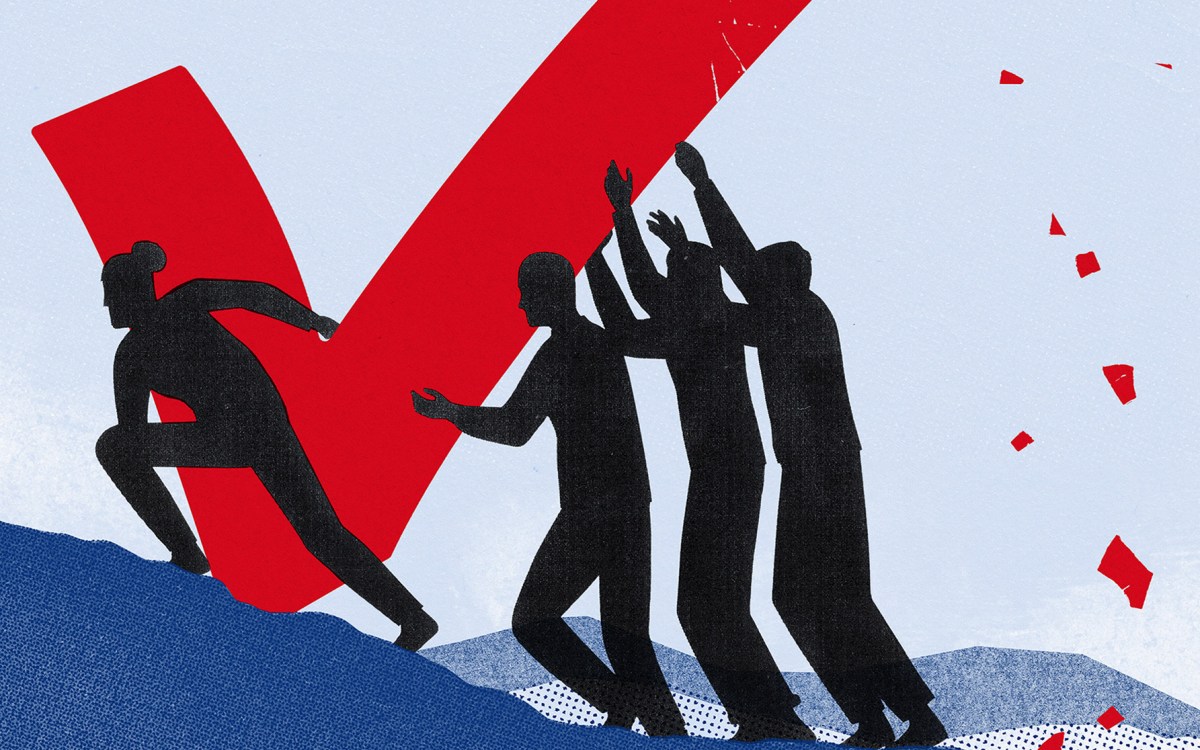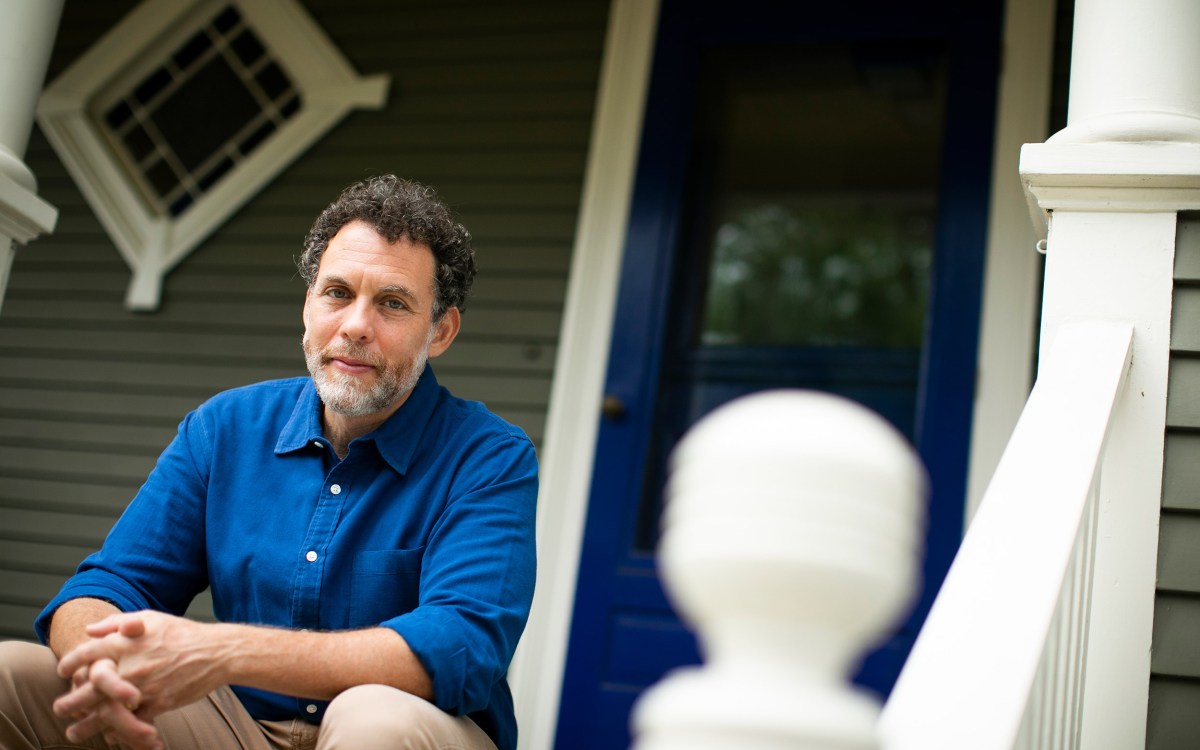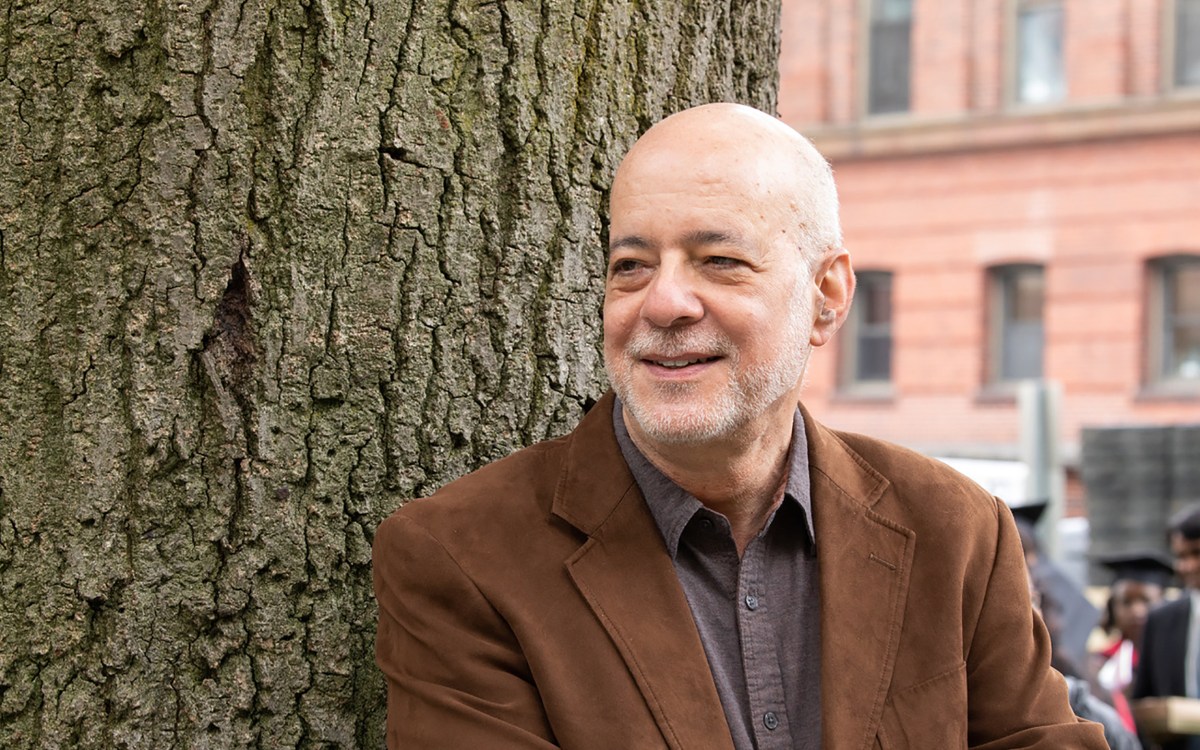Should we be worried about rising heat of political discourse? Yes.

Illustration by Matt Harrison Clough/Ikon Images
Some analysts fear it could lead to violence; others note nation has had other worrisome periods; all agree it’s not a good trend for democracy
Most Americans believe political discourse has grown coarser in recent years, as old taboos against publicly cursing and attacking an opponent’s family have fallen away. Politicians and their supporters call critics and opponents “criminals” or “fascists,” while some 2024 presidential candidates muse about executing the nation’s top military adviser or pledge to “slit the throats” of a bloated public workforce. Many worry the way we talk about politics is dangerously incendiary.
Those worries are not unfounded: Threats to members of Congress are historically high, according to U.S. Capitol police. From 2017 to 2021, they soared, from 3,900 to 9,625 annually. Since the Jan. 6 insurrection, when protesters attacked police and vowed to harm the vice president and top Democratic leaders, threats of violence to lawmakers in both parties, state officials, school board members, and even federal judges have become almost routine. From 2016 to 2021, threats made against federal judges climbed 400 percent, the U.S. Marshals Service reports.
Some analysts who study speech associated with authoritarian movements and genocide say there is cause for concern about the possibility that discourse condoning violence will lead to violence. Other observers say the nation has weathered earlier periods where political debate turned deeply vitriolic, and while we’ve not yet hit an absolute low point historically, all agree the downward trajectory of political speech is alarming for American democracy.
“There’s absolutely no question that speech convinces people to do things,” said Susan Benesch, a human rights attorney and faculty associate of Berkman Klein Center for Internet & Society at Harvard. “There’s very strong evidence of at least a correlation between dangerous speech and mass violence.”
Proving a causal link between the two, however, is more difficult because those who commit violence are often influenced by many different things, and that influence accrues gradually and cumulatively. “So, it’s very rare to be able to say it was because of this particular speech act,” she said.
The power of political speech varies depending on the language, speaker, medium, social and historical context, and audience, said Benesch, who founded and runs the Dangerous Speech Project, which tracks and studies the language, images, and other forms of expression that make people more likely to condone or commit violence.
Former President Donald Trump’s now-famous tweet to his supporters — “Big protest in D.C. on January 6. Be there, will be wild!” — is an example of the powerful convergence of message, context, and audience.
“There is absolutely no question that many of his followers understood what he said as a call to violence,” said Benesch. “What matters is not what [Trump] had in his mind, but what his followers understood him to be saying. And his followers understood it as a call to violence and to act accordingly. And so, they came to see people like [House Speaker] Nancy Pelosi and [Vice President] Mike Pence as their enemies. And they saw it as not only acceptable, but in fact, righteous and virtuous to attack those people and even to kill them.”
Americans’ view of political violence as an acceptable means to settle disputes has reached alarming levels. Political scientists at Johns Hopkins and the University of Wisconsin-Madison found that in February 2021, 20 percent of Republicans and 13 percent of Democrats said political violence was warranted these days, while 25 percent of Republicans and 17 percent of Democrats said threats to opposing party officials were defensible. If accurate, that approaches the level of support Catholics and Protestants in Northern Ireland held about political violence at the height of “The Troubles” in 1973.
“We are a deliberative democracy; we’re supposed to deliberate. I’m not sure we’re doing our worst right now, historically, but I think we’re at a low point and I worry a little that the trajectory is still [going] down.”
James Engell, professor of English and comparative literature
Steven Pinker, Johnstone Family Professor of Psychology at Harvard, is not convinced political speech is truly becoming more violent as a result of partisan animosity, in part because of our tendency toward recency bias — giving undue weight to recent experiences or new information — and because of the nature of the English language, which “is highly metaphorical in ways that we often don’t realize,” he said, drawing on the work of cognitive linguists George Lakoff and Mark Johnson.
In everyday matters, our language, particularly in regard to competition or dispute, is often infused with metaphors of war. “If you say, ‘He attacked my argument,’ it’s not necessarily that you’re thinking in terms of aerial bombardment and artillery,” Pinker said. “There’s a historical transition when a metaphor is first introduced, as in poetry. It’s intended to call to mind the reference image, but then over time, it just becomes part of the language, and no one even thinks to the literal meaning of the words.”
In any event, violent and inflammatory language in American politics is certainly not new. The anti-Communist crusade by Wisconsin Sen. Joseph McCarthy in the 1950s and the dismantling of Reconstruction by white supremacists were savage; and even the presidential election between John Adams and Thomas Jefferson in 1800 was vicious, an absolute “cesspool of personal attacks,” said James Engell, ’73, Ph.D. ’78, Gurney Professor of English Literature and Professor of Comparative Literature.
While political figures today employ many techniques of classical rhetoric, including ad hominem attacks, coded language or “dog whistles,” and partial syllogisms known as enthymemes, it’s wrong to call it political rhetoric, he said.
Rhetoric “is not a hired gun. It is not a tool just to get what you want,” said Engell, who teaches a course on the subject. “It is a consideration, in language, of difficult, often seemingly intractable, problems of interpretation and consensus.”
“If you say, ‘He attacked my argument,’ it’s not necessarily that you’re thinking in terms of aerial bombardment and artillery. … [O]ver time, [a metaphor] just becomes part of the language, and no one even thinks to the literal meaning.”
Steven Pinker, psycholinguist
Historically, rhetoric was not associated with politics, but rather with religion, law, and education, where interpretation, textual analysis, debate and dissent, and the presentation of argument using evidence were key, Engell notes. John Quincy Adams, the first Boylston Professor of Rhetoric and Moral Philosophy at Harvard College, saw rhetoric as a tool to further the common good.
“Adams goes out of his way to say it’s deeply important in a deliberative democracy and that rhetoric is not merely a matter of persuasion, it is not merely a matter of manipulation. It is a way of examining a question that is debated, or values which are to be put forward, or decisions that are to be made, in a way that is open and full,” he said.
“We are a deliberative democracy; we’re supposed to deliberate. I’m not sure we’re doing our worst right now, historically, but I think we’re at a low point and I worry a little that the trajectory is still [going] down.”
Given the current political tone and climate, the months until the 2024 election “will be extraordinarily difficult. I think we are entering a period that is one of considerable trepidation and danger,” said Engell.
“Fear is probably the strongest of all human emotions, along with grief. And when you tell people that something is being lost, you are calling on both their grief and their fear — grieving for something that is disappearing that was good and right and just, and now, you are saying it’s being lost. And then, you are talking about something having been taken away from you. That creates both fear and anger.”







